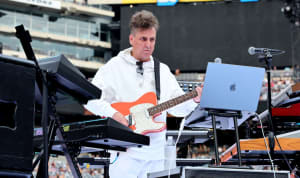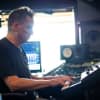 Photo courtesy of Mike Dean
Photo courtesy of Mike Dean
There’s no surprise when discussions on rap twitter — about topics small and large — evolve into spicy back-and-forths, often ending up somewhere miles away from the initial subject. One of the more entertaining instances of this in recent memory happened last week when electronic music producer Zedd questioned the appeal of Harlem rapper Sheck Wes’s breakout hit “Mo Bamba.” While Fools Gold founder A-Trak defended the song’s merits, Zedd questioned its musicality, tweeting “I judge music by melody, chords, structure, lyrics. I’m a musician.” That response to A-Trak’s endorsement is akin to many people’s assessment of hip-hop since its inception in the late ‘70’s. But, Zedd’s dismissal was soon met with concrete evidence of the song’s musicality.
Take A Daytrip, the producers of “Mo Bamba,” answered the criticism by tweeting out the music theory behind the Harlem rapper’s hit. And to add insult to injury, decorated producer and engineer Mike Dean followed up by revealing that he uses the same elements of music theory to concoct much of Travis Scott’s output. The entire ordeal was entertaining, but more importantly, it became an opportunity to learn for people who don’t believe in the musical aspect of hip-hop.
While in New York City, getting ready for Travis Scott’s performance on SNL this past weekend, Mike Dean invited The FADER to his hotel suite to talk about music theory in rap, what it was like working on ASTROWORLD, and what producers excite him right now.
We’re 40 years down the line with hip-hop and an attitude that a lot people still have towards it is that it doesn’t come from a musical foundation.
A lot of stuff still isn’t. A lot of producers don’t know shit from Shinola. You know, they just know how to make music that sounds good and it works. No disrespect to people that don’t use music theory or don’t know it. It does help to be able to figure out what key a song is in, even though with your scales you can figure it out so you can set your Auto-Tune right. So many songs with Auto-Tune are off or have the wrong note playing on the 808. And they pass it off as being hood.
Do you respect younger producers more who do have a grasp on music theory? Take a Day Trip breaking down music theory to Zedd was basically like a fuck you.
That was good. I didn’t know too many people really understood that. That kind of clicked on me a couple years ago that that’s what we were doing. Like Oh wow, this is the five and the six *plays chords that resemble Travis Scott production*. It’s a E flat minor which is the first note we play. It’s interesting.
The general consensus on ASTROWORLD seems to be that it’s Travis’s most well put together as far as sound goes. Did you all approach the album any differently than his previous projects?
We just get better and better every time, you know? The next album will be better.
“Stop Trying to Be God” is one in particular that just feels like it’s a new level for him. What was it like putting that song together?
It was crazy. It took like a year for it to all come together. Travis had to first part done and it just developed. I got a call one day that Stevie was coming to the studio and I was like I’ll be right there [laughs]. I recorded his harmonica. Like, I never record people very much anymore. I just get somebody else to do that. With Stevie, I’m not gonna switch to someone else.
Was it always the plan to have him on there?
It just happened, you know. Just running into people at hotels and wherever people run into each other.
It’s rare to hear about anyone working on something for a year now.
Travis might have spent longer. He spent two years on the album. He’s always working.
Did you have your hands on the entire album? How does it usually go when you work together?
I usually come in about halfway through. I hear the stuff as he records it. I think about it for two or three months before I attack it. We have to take our time.
From a music theory standpoint, is there anyone right now who sticks out to you? Like, a person whose production is more elevated than some people realize.
André 3000. He’s one of those guys. He’s playing bass clarinet now. He’s in the jazz clubs right now. He’ll come to the studio with his clarinet and just walk around playing it all day. When we were working on Kanye’s last album he was in there.
Had you ever listened to Sheck Wes and thought, oh they’re doing something similar to what I do with Travis or was that news to you?
Nah, that’s just the sound now. You know, that progression is like, real suspenseful. It’s got a nice relief when you resolve it. Makes you feel — it’s the same thing with Kanye. You know, minor key. If you go to a relative major, it just makes you feel happy for a minute. Then you go back to minor and you feel sad and melancholy *plays a melody similar to Kanye West’s “Say You Will”*.
You were there for the very beginning of Houston’s rap legacy. So with that in mind, do you feel like ASTROWORLD was one of the more successful efforts at turning those classic Houston elements into something contemporary? I mean, all of Travis’s albums have those elements but for this, they were really on front street.
With this album, he really represented Houston well which is good. He’s still finding himself as an artist, you know? Still reinventing himself. I like how he reached out. I put the Big Hawk stuff in there. He interpolated a couple others and all those Houston samples.
Was there anything classic y’all slid into the album that felt like a perfect marriage from the start? Like, was there anything on there that was like, if people know what this is, it’s really gonna excite them?
The Big Tuck sample.
Which one was that?
The Frank Ocean one — “Carousel.” That was a big Texas song — Big Tuck from Dallas, “Not a Stain On Me.” When people in Houston hear that, immediately it turns up the club. That was Travis who did that.
What are you working on right now that you’re excited about?
Just mixed a song for Quavo’s album coming out. It’s a song with him and Travis on there.
At this point of your career, with all the artists you’ve worked with, how do you decide something is worthwhile? What would make you choose to work with a lesser known artist?
Just if I feel it and if I like it. It’s all about what I like really. If I hear music that has a hole in it and has a space for me to fit in, I go for that stuff.
Any recent examples of someone’s work you filled in a gap for?
“5% Tint” on ASTROWORLD. That song was done and I took it and thought I needed to make an ending for that shit. I just needed it to go somewhere else. That was the first production I did on the album.
What was it like before you touched it?
It was just the song and it stopped, which would have been dope too, but I wanted to take it on a journey with the Screw shit and the opera shit.


